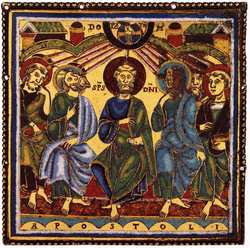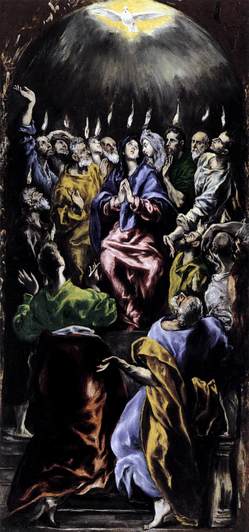We are firmly living the days of the Paschal Mystery. What God has given us and what the Church faithfully teaches is that nothing is done without the action of the Holy Spirit. Our encounter with the Lord Jesus Christ, our prayer to the Blessed Trinity, is firmly rooted in the Pauline belief that it is the Holy Spirit who first places within our hearts the desire for communion with God the Father, God the Son and God the Holy Spirit. That same Spirit breathes within us the grace of eternal life and places on our lips the words we pray. Thinking about this dogma of our Catholic faith, I found an encyclical of Pope Leo XIII which guides our spiritual life to depend more deeply on the Holy Spirit today.

That divine office which Jesus Christ received from His Father for the welfare of mankind, and most perfectly fulfilled, had for its final object to put men in possession of the eternal life of glory, and proximately during the course of ages to secure to them the life of divine grace, which is destined eventually to blossom into the life of heaven. Wherefore, our Savior never ceases to invite, with infinite affection, all men, of every race and tongue, into the bosom of His Church: "Come ye all to Me," "I am the Life," "I am the Good Shepherd." Nevertheless, according to His inscrutable counsels, He did not will to entirely complete and finish this office Himself on earth, but as He had received it from the Father, so He transmitted it for its completion to the Holy Ghost. It is consoling to recall those assurances which Christ gave to the body of His disciples a little before He left the earth: "It is expedient to you that I go: for if I go not, the Paraclete will not come to you: but if I go, I will send Him to you" (1 John xvi., 7). In these words He gave as the chief reason of His departure and His return to the Father, the advantage which would most certainly accrue to His followers from the coming of the Holy Ghost, and, at the same time, He made it clear that the Holy Ghost is equally sent by-and therefore proceeds from - Himself and the Father; that He would complete, in His office of Intercessor, Consoler, and Teacher, the work which Christ Himself had begun in His mortal life. For, in the redemption of the world, the completion of the work was by Divine Providence reserved to the manifold power of that Spirit, who, in the creation, "adorned the heavens" (Job xxvi., 13), and "filled the whole world" (Wisdom i., 7).
... we ought to pray to and invoke the Holy Spirit, for each one of us greatly needs His protection and His help. The more a man is deficient in wisdom, weak in strength, borne down with trouble, prone to sin, so ought he the more to fly to Him who is the never-ceasing fount of light, strength, consolation, and holiness. And chiefly that first requisite of man, the forgiveness of sins, must be sought for from Him: "It is the special character of the Holy Ghost that He is the Gift of the Father and the Son. Now the remission of all sins is given by the Holy Ghost as by the Gift of God" (Summa Theologica 3a, q. iii., a. 8, ad 3m).

Concerning this Spirit the words of the Liturgy are very explicit: "For He is the remission of all sins" (Roman Missal, Tuesday after Pentecost). How He should be invoked is clearly taught by the Church, who addresses Him in humble supplication, calling upon Him by the sweetest of names: "Come, Father of the poor! Come, Giver of gifts! Come, Light of our hearts! O best of Consolers, sweet Guest of the soul, our refreshment!" (Hymn, Veni Sancte Spiritus). She earnestly implores Him to wash, heal, water our minds and hearts, and to give to us who trust in Him "the merit of virtue, the acquirement of salvation, and joy everlasting." Nor can it be in any way doubted that He will listen to such prayer, since we read the words written by His own inspiration: "The Spirit Himself asketh for us with unspeakable groanings" (Romans viii., 26). Lastly, we ought confidently and continually to beg of Him to illuminate us daily more and more with His light and inflame us with His charity: for, thus inspired with faith and love, we may press onward earnestly towards our eternal reward, since He "is the pledge of our inheritance" (Ephesians i. 14).
Wherefore, We
decree and command that throughout the whole Catholic Church, this year and in
every subsequent year, a Novena shall take place before Whit-Sunday, in all
parish churches, and also, if the local Ordinaries think fit, in other churches
and oratories. To all who take part in this Novena and duly pray for Our
intention, We grant for each day an Indulgence of seven years and seven
quarantines; moreover, a Plenary Indulgence on any one of the days of the
Novena, or on Whit-Sunday itself, or on any day during the Octave; provided
they shall have received the Sacraments of Penance and the Holy Eucharist, and
devoutly prayed for Our intention. We will that those who are legitimately
prevented from attending the Novena, or who are in places where the devotions
cannot, in the judgment of the Ordinary, be conveniently carried out in church,
shall equally enjoy the same benefits, provided they make the Novena privately
and observe the other conditions. Moreover We are pleased to grant, in
perpetuity, from the Treasury of the Church, that whosoever, daily during the
Octave of Pentecost up to Trinity Sunday inclusive, offer again publicly or
privately any prayers, according to their devotion, to the Holy Ghost, and
satisfy the above conditions, shall a second time gain each of the same
Indulgences. All these Indulgences We also permit to be applied to the suffrage
of the souls in Purgatory.
(Divinum
Illud Munus, 1, 11, 13)
Following the pastoral leadership of Pope Leo XIII, I recommend that we pray the Novena to the Holy Spirit


Leave a comment